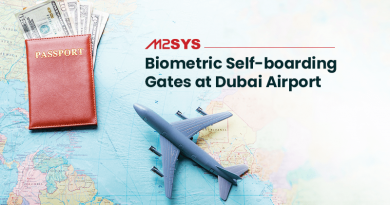Is Biometric Technology The “Go To” Solution To Prevent Bank Fraud?
Introduction
Data breaches in banking have become commonplace all over the world. Most banks and financial institutions continue to rely on historical password based security systems which are increasingly susceptible to cyber breaches and no longer able to reliably secure data or to prevent bank fraud.
Continuous data breaches in the banking industry clearly demonstrates how antiquated existing identification security is, and something has to change. Due to the challenges that passwords, personal identification numbers (PINs) and physical ID cards present, the banking industry is searching for new technologies which can provide stronger data protection from hackers and they are now considering biometric solutions to solve the problem.
History of Bank Fraud
Although data breaches are regular incidents, they only tend to go viral when they impact high profile companies like . According to a new report by the Identity Theft Resource Center (ITRC) and CyberScout, the number of U.S. data breaches tracked in 2016 hit an all-time record high of 1,093 increasing 40% from the year prior. A few months back, British retail bank Tesco faced a massive data breach where 40,000 accounts were affected and money was taken from 20,000 accounts. India’s largest data breach affected 3.2 million customers whose card data was stolen between May 25th and July 10th from a network of Yes Bank ATMs managed by Hitachi Payment Services. In 2014, JPMorgan Chase faced a massive data breach where personal information from 76 million households and 7 million small businesses were affected, costing them $1 billion even after spending $250 million annually on cybersecurity.
Why Biometric Technology?
We need to understand how biometric technology works and the metrics behind it in order to determine if it is the best solution to increase data security protection in the banking and financial services industries. In short, biometrics are the measurement and statistical analysis of physical and behavioral human characteristics which compares these measurements and characteristics with previously registered data to identify a person.
The most widely used biometric modalities are fingerprint, finger vein, palm vein, iris, and facial recognition. Due to the fact that every human being is unique, individual biometric attributes are also unique and almost impossible to replicate or forge which makes biometric technology a secure identification technology.
Banks are always committed to provide the most convenient system to authorize customer identities quickly and accurately. Through biometric technology customers can verify themselves by their physiological traits against a stored profile within a database, providing them the trust and confidence that their identities are well protected.
Banks and financial institutions can also implement biometric identification for employees to create and maintain an accurate log of system transactions and activities. This can be particularly helpful to reduce litigation expenses in the event of a lawsuit or legal action by an employee or customer who may dispute a transaction.
Both of these examples demonstrate how biometric identification for both customers and employees creates and maintains an accurate and concrete audit trail of every transaction.
M2SYS CertisID™ Financial Services Biometric Identification Solution
In the banking and financial services industries, the most important objective is to protect public data. A massive data breach could result in millions of dollars in losses to banks, who consequently they try their best to ensure airtight security and a concrete audit trail of transactions.
Biometrics provides the most secure data protection by using individual physiological characteristics for identification, which are nearly impossible to spoof or forge. As a result, more banks and financial institutions are gradually implementing biometrics to prevent bank fraud.
The Use of Biometric in Banks
Biometrics could be implemented in banking systems through a variety of ways to protect them from data breaches helping to raise end user convenience. The most promising implementations include:
- Biometrics in branch banking
- Biometrics in ATMs
- Biometrics for internet banking
- Biometrics in mobile banking
- Single sign-on (SSO) form more effective password management
Future of Banking Security
In the near future biometrics will most likely remove the password and PIN system in banking. Already, Visa Europe published a report that said:
- Three-quarters of 16-24 year olds would feel comfortable using biometric security
- 69% believe it will be faster and easier than passwords and PINs
- Half of young people foresee the death of passwords by 2020
Apart from passwords and PINs, another revolution will come in mobile banking and online banking. According to a report from Clarabridge, 78% of mobile banking customers are satisfied with the service and 36% of banking customers in the US haven’t visited a branch in the past month.
Conclusion
Biometric technology is the best technology to prevent bank fraud because it is the most secure solution to protect branch banking, online banking, ATM networks, and mobile banking. To establish customer trust and loyalty, banks should consider implementing the most secure and convenient security system to ensure accurate transactions, prevent fraud, and establish a concrete, indisputable audit trail.













